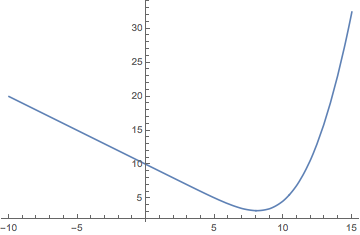The equations have some pretty large and small numbers at work in them. Sometimes that can be a problem because of the limits of a finite machine. Some of the limits are
$MaxNumber (*$*)
$MinNumber (*$*)
$MachineEpsilon
(*
1.605216761933662*10^1355718576299609
6.229688249675322*10^-1355718576299610
2.22045*10^-16
*)
($MachineEpsilon is the limit on the ratio of terms x > y such that x + y is different than x. Even when the ratio close, only a few higher-order bits of the smaller number are significant in the sum. For sensitive system with lots of such sums, this might be an issue, although it does not seem to be so in this case.)
So first, let's convert the formulas to exact expressions. I also substitute Erfc for 1 - Erf, to avoid round-off error, since the arguments to Erf range in the positive and negative millions and the values of Erf are identical to ± 1 at machine precision.
R[k_, x_, t_] := -(1/2)*(k - x)*Erfc[(k - x)/t];
L[k_, c_, x_, t_] := (1/2)*c*(k - x)*Erfc[-(k - x)/t];
Clear[f]
f[k_] = Sum[(R[k, i, [email protected]]^1 + L[k, 1, i, [email protected]]^2)*
Binomial[40, i]*(1/4)^i*(3/4)^(40 - i), {i, 0, 40}];
We can get an idea of what's going on by plotting (ignoring the underflow messages that come from large arguments to Erfc):
Plot[f[k], {k, -10, 15}]

There appear to be just two roots, one at near 0 and one around 11 or 12. We can search for them with NDSolve:
Last@ Reap@
NDSolve[{k'[t] == 1, k[-10] == -10,
WhenEvent[f[t] == 10,
Sow[x /. FindRoot[f[x] == 10, {x, t}]]]}, {}, {t, -10, 20}]
General::unfl: Underflow occurred in computation. >>
...
(*
{{-8.91463*10^-16, 11.8286}}
*)
I couldn't raise the working precision:
Last@Reap@
NDSolve[{k'[t] == 1, k[-10] == -10,
WhenEvent[f[t] == 10,
Sow[x /. FindRoot[f[x] == 10, {x, t}, WorkingPrecision -> 20]]]}, {},
{t, -10, 20}]
General::unfl: Underflow occurred in computation. >>
...
General::nomem: The current computation was aborted because there was insufficient memory available to complete the computation.
Throw::sysexc: Uncaught SystemException returned to top level. Can be caught with Catch[..., _SystemException]. >>
SystemException["MemoryAllocationFailure"]
Evaluating an Erfc with a very large argument at arbitrary precision seems to takes gigabytes.
Now let's look at the underflow warnings. If we look at the last term in f[0], we get
Last@f[0]
(* (20 Erfc[-40000000] + 400 Erfc[40000000]^2)/1208925819614629174706176 *)
Now, Erfc[40000000] is a little less than Sqrt[$MinNumber]:
Erfc[40000000.]
(* 1.686668849131491*10^-694871171045211 *)
So squaring it will result in underflow. Since 400 times the square is being added to 20 Erfc[-40000000], it is effectively zero anyway.
If we look at all the terms of f at the zeros, we get
f[0] /. Plus -> Inactive[Plus] /. x_Integer | x_Rational :> N[x] //
Short[List @@ #, 20] &
General::unfl: Underflow occurred in computation. >>
(*
{0.000134088 (1. + 2.495050185825339*10^-868588963820),
0.000871571 (2. + 7.69*10^-3474355855240),
0.00367997 (3. + 2.333625160219760*10^-7817300674272),
<<34>>,
5.80681*10^-21 (38. + 4.412141103756946*10^-1254242463736605),
9.92617*10^-23 (39. + 5.915985858762761*10^-1321123813949706),
8.27181*10^-25 (40. + Underflow[])}
*)
f[Rationalize[11.828562582665537`, 0]] /. Plus -> Inactive[Plus] /.
x_Integer | x_Rational :> N[x] // Short[List @@ #, 20] &
(*
{0.105721 (0.171437 + 2.523363170467293*10^-25528514162),
0.13124 (0.686516 + -1.420977915095513*10^-298150090304),
0.0759025 (1.17144 + 3.100452009927070*10^-1191934775329),
<< 36 >>,
9.92617*10^-23 (27.1714 + 1.248075143733985*10^-641267950157834),
8.27181*10^-25 (28.1714 + 1.153984027103677*10^-689338160464552)}
*)
The upshot is that the two roots we found seem reliable. In f[0.] the error function is pegged at the extremes of its range, but in f[11.8] only half are effectively zero. Although f[0.] evaluates to 10. (exactly), it's difficult to see whether the root is exactly k == 0. Considering this,
f[0] /. Erfc[x_?Negative] :> 2 - Erfc[-x] /. _Erfc -> 0
(* 10 *)
all the error function terms would have to cancel out for f[0] to be exactly 10. But looking at the linear and squared Erfc terms, they do not appear to cancel, although they are too small to be considered practically different from 0.
foo - 10 /. {Erfc[_]^2 -> 0} // Simplify // N (* linear Erfc terms *)
foo - 10 /. {x : Erfc[_]^2 :> x, _Erfc -> 0} // Simplify // N (* squared Erfc terms *)
(*
-2.118062622431921*10^-434294481914
3.345710199166185*10^-868588963824
*)
(Note that the first rule in {x : Erfc[_]^2 :> x, _Erfc -> 0} prevents the Erfc in a squared term from being replaced by 0.)


RandL. I did that and I do not get your message. I get get "Solve::nsmet: This system cannot be solved with the methods available to Solve. >>" instead, but that is a whole different matter. $\endgroup$